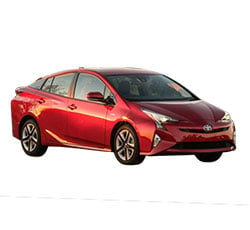2018 Toyota Prius Pros vs Cons. Should You Buy?

What's New for 2018?
Don't expect too many changes to be made to the Prius until 2019 since it was just revamped in 2016. Many features and specs carry over from the 2017 models to the 2018 Toyota Prius. Toyota is now building the Prius under its new platform, TNGA. This year, the biggest change is that alloy wheels now come standard across the entire line-up.
Top 10 Reasons to Buy a 2018 Toyota Prius – The Pros
1. Stellar Fuel Economy
The 2018 Toyota Prius gets a fantastic fuel economy. Regardless of which trim level you choose, you will get approximately 54 mpg city and 50 mpg highway. It is hard to find something else that gets this good of a fuel economy, which, naturally, makes this a huge selling point for the Prius.
2. Spacious Interior
For being such a small vehicle, the interior of the 2018 Toyota Prius is surprisingly spacious. Although rear seat passengers might feel slightly cramped, anyone sitting up front will have more than enough head, shoulder, and leg space.
3. Many Standard Active Safety Features
Since Toyota places a huge emphasis on safety, it is no wonder that the Prius has a long list of standard and optional active safety features. The Toyota Safety Sense suite comes standard on each model and includes a Pre-Collision warning, pedestrian detection, automatic high beams, and Lane-Departure alert.
4. Easy-to-Use Controls
All of the controls on the 2018 Toyota Prius are clearly marked and easy for any driver to use. There is no having to guess what a knob or button might do. All controls are easy to access from the driver's seat, and several important controls are mounted on the steering wheel.
5. Easy to Get In and Out
Getting in and out of the vehicle is easy, especially up front. Doors swing out pretty wide, and there is enough height for people of any size to swing their legs out. Also, you won't have to worry about bumping your head on the doorframe while getting out.
6. Good Front and Side Visibility
Although rear visibility is obstructed, the roof pillars up front are slender enough to allow for a good amount of front and side visibility. The front windshield is nice and broad, and drivers won't have a problem figuring out how close their front bumper is to another car or the sidewalk.
7. Plenty of Cargo Space
It might not look like it, but there is a surprisingly large amount of cargo space in the 2018 Toyota Prius. The 60/40 rear split seats can be folded down to help maximize the amount of cargo space available, making it easy to tote bulky items around.
8. The Infotainment System
Toyota's infotainment system is one of the better systems out there. The base Prius comes with a 6.1-inch touchscreen infotainment display, Bluetooth, USB port, voice commands, and a four-speak stereo system. Moving up in trim levels, you can get navigation, the Etune app suite, and satellite radio added into the mix, all for a rather reasonable price.
9. Responsive Steering
Steering on the Prius feels natural and responsive. Any driver will notice that they get a good amount of feedback, especially as to how the steering system handles difficult turns and winding roads. The smaller the tires you get, the better you will feel about making these kinds of turns.
10. Secure Handling
Handling feels secure, and the Prius is quite a nimble little vehicle. While the tires lack a little bit of grip, the vehicle itself feels very balanced and steady while driving in most weather conditions.
Reasons Not to Buy a 2018 Toyota Prius – The Cons
1. Stiff Ride Quality
Unfortunately, the biggest drawback to driving the 2018 Toyota Prius is that it has a rather stiff ride quality. The tires are definitely designed for getting good mileage, not for absorbing every shock in the road. Even the Prius c hatchback feels a bit more comfortable than the regular Prius, which can feel pretty rough while going over even minutely difficult road terrain.
2. Sluggish Acceleration
Acceleration is not the Prius's strong point. While other vehicles in its class are able to get relatively good acceleration, the Prius is built for fuel economy, not for getting up-to-speed on the highway. If you are looking for something with a bit more get-up-and-go power, you will have to consider buying a completely different vehicle.
3. Low-Quality Interior Materials
The Toyota Prius suffers the same issue as some of Toyota's other vehicles currently on the market. The interior looks like it was crafted from subpar materials. While nothing seems ready to break at any moment, the cloth upholstery looks like it won't hold up well over the long-run, and some of the knobs and buttons look prone to wear-and-tear as well.
4. Noisy Cabin At Highway Speeds
Make no mistake about it, this vehicle is not quiet! Along with its stiff ride quality, you will have to endure a ton of road, wind, and engine noise when trying to get the Toyota Prius going over 55 miles per hour on the highway. The cabin seems to lack the proper insulation needed to keep some of the exterior noise out, and the engine tends to throw a fit when the vehicle is pushed to go fast.
How it stacks up to the competition:
2018 Toyota Prius vs. 2018 Hyundai Ioniq Hybrid
The 2018 Hyundai Inoiq Hybrid is a top-notch competitor for the Prius with its 58 mpg fuel economy, which is absolutely best-in-class for this year. However, the Ioniq isn't as spacious and doesn't have a big plug-in range.
2018 Toyota Prius vs. 2018 Honda Civic Hybrid
The 2018 Honda Civic Hybrid gets a smaller fuel economy but is a strong performer on the highway or in the city. The Civic is surprisingly spacious and is loaded with safety features.
Conclusion
Overall, the 2018 Toyota Prius is a very fuel-efficient car with a good amount of space. While it is going to have to amp it up in 2019 to keep competing with newer hybrid models from other automakers, the Prius is still holding onto one of the top spots for hybrid sales due to its emphasis on fuel efficiency.
• 2018 Toyota 4Runner Pros VS Cons
• 2018 Toyota 86 Pros VS Cons
• 2018 Toyota Avalon Pros VS Cons
• 2018 Toyota Camry Hybrid Pros VS Cons
• 2018 Toyota Camry Pros VS Cons
• 2018 Toyota C-HR Pros VS Cons
• 2018 Toyota Corolla Pros VS Cons
• 2018 Toyota Highlander Pros VS Cons
• 2018 Toyota Prius C Pros VS Cons
• 2018 Toyota Prius V Pros VS Cons
• 2018 Toyota Prius Pros VS Cons
• 2018 Toyota Rav4 Pros VS Cons
• 2018 Toyota Sequoia Pros VS Cons
• 2018 Toyota Sienna Pros VS Cons
• 2018 Toyota Tacoma Pros VS Cons
• 2018 Toyota Tundra 2WD Pros VS Cons
• 2018 Toyota Tundra 4WD Pros VS Cons
• 2018 Toyota Yaris iA Pros VS Cons
• 2018 Toyota Yaris Pros VS Cons

